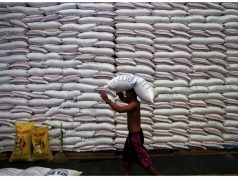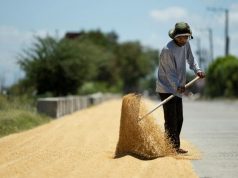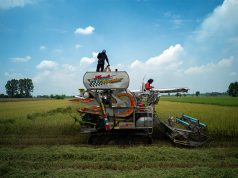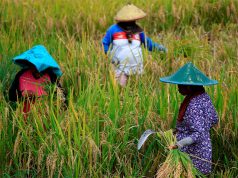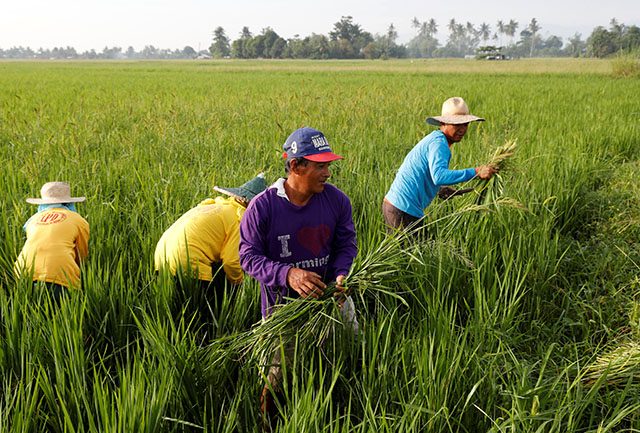
The fuller importation of rice from other countries resulted in the plunging prices of local rice, benefiting the rice-eating populace but hurting the livelihood of many Filipino farmers.
Farmers’ advocates are posting images online to raise awareness on how little they were earning since the Rice Tariffication Law was implemented in 2018.
Facebook user Rommel Villacoba Tayao argued that it is unfair for the rice farmers to pay and work for their livelihood and gain nothing from it due to the current policies.
This was posted on August 28 and made rounds more than 64,000 times after.
#SAVE OUR FILIPINO FARMERS.. KUNG IKAW AY MAGSASAKA, ANAK NG MAGSASAKA O MAY KAMAG-ANAK NA NAGSASAKA PLEASE…
Posted by Rommel Villacoba Tayao on Wednesday, August 28, 2019
“Sa hirap ng buhay lalo napo ang magsaka, kadalasan sa land preparation palang nagkakanda utang utang na tayo. Ang ginagamit nating gasolina at diesel panay ang taas. Ang mga pataba, binhi, pamatay peste at pamatay damo walang control ang presyo sa pagtaas,” Tayao said.
He also appealed to the public to help save the farmers.
“Sa Pilipinas ang magsasaka ang pinaka kawawa, kaya please lang naturingan p naman tayong agricultural country pero ang magsasaka ang lugmok sa kahirapan,” he said.
Another user Krianne Fedelin explained the calculations on how the current value of rice crops does not convert into earnings for the farmers.
“It is ironic that farmers are the one feeding the nation yet they cannot feed themselves,” Fedelin said.
CHANGE HAS COME!Rice fields are turning gold and two weeks from now, harvesting season will start here in Oriental…
Posted by Krianne Fedelin on Wednesday, August 28, 2019
Prior to this, advocacy page Mindanao’s Rice Granary Watch—Bantay Bigas South Cotabato shared a post that listed prices of newly harvested palay from P12 to P14 per kilo before. The prices dropped to P8 per kilo after the law was signed.
What is the Rice Tarrification Law?
Republic Act 11203, an amended version of the two-decade-old Agricultural Tariffication Act of 1996, was signed into law to help stem rising inflation.
These amendments have lifted quantitative restrictions on rice, the preferential trade deal the Philippines secured after becoming a member of the World Trade Organization in 1999.
The QR limits the volume of rice imports from Southeast Asian countries like Vietnam and Thailand and protects local farmers from foreign competition every year.
However, in 2017, the Duterte administration did not renew the waiver that allowed restrictions when it expired.
Without the restrictions on rice imports, foreign businesses have imported cheaper crops, thereby competing with local rice production.
The Rice Tarrification Law’s effects
Allowing cheaper foreign imports to pour in without preparation for local farmers could hurt their livelihood.
Sen. Cynthia Villar, who sponsored the rice tarrification bill and the chairperson of the agrarian reform, earlier claimed the information of devalued palay as false.
“It (palay prices) won’t go down to P7 a kilo, I assure you,” the senator said.
She also said that only P1 billion of P5 billion of rice competitiveness enhancement fund were released since last August.
Last May, however, the Philippine Chamber of Agriculture and Food said that the tarrification law, also known as rice liberalization law, stripped the farmers of P95 billion in income due to the influx of cheap rice.
“At the prevailing farmgate price of palay (unhusked rice) which declined by around P5 per kilogram, Filipino farmers are deprived by as much as P95 billion in income. It is based on the country’s local palay production of 19 million metric tons annually,” a member of the organization said.
Last July, the Federation of Chinese Chambers of Commerce and Industry Inc. urged President Rodrigo Duterte to review the provisions of the tarrification law.
The chamber’s president, Henry Lim Bon Liong, noted that the El Niño phenomenon caused over 140,000 rice farmers further pain, gutting the rice sector with a loss of more than P4 billion.




